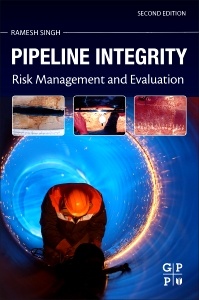Description
Pipeline Integrity (2nd Ed.)
Management and Risk Evaluation
Author: Singh Ramesh
Language: English
Subject for Pipeline Integrity:
Keywords
3LPE; 5-Why; 8-Ms; Anomaly severity; API 5L; API 6D pipeline valves; API 6FA; ASME B31G; ASTM; Baseline; Cathodic protection; CFR 49 Part 192DA; CFR 49 Part 195DOT; Check valves; CIP; Consequence analysis; Corrosion; Data collection and analysis; Data collection; Direct current voltage gradient; DOT CFR 195 and CFR 192GIS; DOT; Drop weight tear test; Dynamic segmentation; ECDA; Eddy current; Elbows; Electric resistance welding (ERW)High-frequency (induction) welding (HFW)Impact testing; External corrosion; Failure mode; Fiberglass-reinforced plastic; Field joint coating; Fittings; Flanged and butt welded steel valves; Flanges; Flaw size; FMEA; FTA; Gas pressure fluctuations; Gasket; Gaskets; gates; Guided wave ultrasonic testing; Hazard zone; Hazard; HAZOP; HCA; Hydrogen permeation; Hydrogen-induced cracking; Hydrotesting; ICDA; ILI tools; ILI; In line inspection (ILI)LPR; Induction bends; Information management; Inspection and testing of valves; Integrity management; Internal corrosion; Ishikawa diagram AND and OR ISO 3183Line pipe; Laves; Leak impact factor; Leak test; Maintenance time between failures; Maintenance; Managing the risks; Metal ball valves; MFL; Microbiologically induced corrosion; MIS; NACE material; NACE trim; Office of pipeline safety; Over protection; Paradigm shift; PHMSA; PIR; Plug valves; Pneumatic testing; Polarization criteria; Pressure reversal; Probability; Product characteristics; Proof test; PSL; Pumps; Qualitative investigation; RBI; RBM; RCA; Receptors; Relative vs absolute risk; Reliability; Reporting; Residual stress; Risk management; Risk; RSTRENG; SCADA; Sensitivity of test; Spill spread; Stakeholders; Steel gate valves; Stress corrosion cracking; Submerged arc welding (SAW)Supplemental assessments; Surface preparation coating; Thermoplastic valves; Total productive maintenance; USAs; Valves for gas distribution; Valves; Variable sensitivity; VDM; Weldolets
Support: Print on demand
Description
/li>Contents
/li>Biography
/li>Comment
/li>
- Set an integrity management plan and safe assessment program while properly characterizing impact of risk
- Get updated with new information on corrosion control, gas and liquid hydrocarbon transportation risk management and asset integrity management
- Understand and apply all the latest and critical oil and gas pipeline standards, both U.S. and international-based




